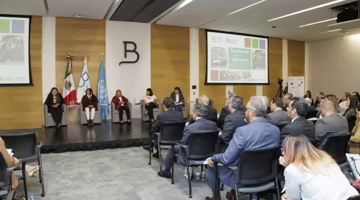UNESCO
June 2023
UNESCO presents experience of the Alberto Baillères Foundation’s Social Model for strengthening educational habitats

UNESCO presented its analysis and evaluation of the Alberto Baillères Foundation’s Social Model, a proposal that accompanies education communities in Mexico in strengthening their social bonds, promoting improvements in school infrastructure, and appropriating school spaces to make them places conducive to well-being and development. Five years after its launch, the Social Model directly and indirectly benefits more than 34,000 people across three states of Mexico.
Since 2019, the UNESCO Office in Mexico has collaborated with the Alberto Baillères Foundation in order to accompany it, document its experiences, and register best practices. The report Transforming Through Education: Contributions of the Alberto Baillères Foundation Social Model in Light of the 2030 Agenda offers a summary of the first findings and results of the Model’s implementation in 14 public schools in Ecatepec, State of Mexico; Iztapalapa, Mexico City; and Kanasín, Yucatan.
The UNESCO Office in Mexico’s presentation of its report highlighted the Foundation’s role in creating partnerships and promoting new forms of social organization based on cooperation and the search for collective well-being. Likewise, it emphasized the innovative character of the process of collaboratively creating educational habitats, understood as sustainable spaces conducive to learning and the development of all members of the education community.
The presentation event for the Transforming Through Education report was attended by senior executives of the Alberto Baillères Foundation, UNESCO, and Grupo BAL, as well as education authorities and members of education communities.
“The Social Model’s greatest challenge consists of ensuring that these educational habitats become sustainable, both in terms of school infrastructure and in terms of caring for the physical and social environment so that education communities can reach full development and be self-managing,” said Alejandro Baillères, President of Grupo BAL and the Alberto Baillères Foundation.
During his speech, Alexander Leicht, Officer in Charge of the UNESCO Office in Mexico, explained that as progress continues with Futures of Education, an international call to rethink education, the work carried out by authorities, education communities, and the Foundation and its partners is an example that it is possible to create partnerships even when differences exist regarding what it means to imagine dignified school spaces and the importance of creating new ways of doing things. Naming and making space for all of this allows experience to become learning and helps everyone’s contributions be valued.
The panel “Living the Social Model In Educational Communities” was held as part of the activities and included the participation of María Guadalupe Barrera Cortina, principal of Preparatoria Oficial 94 (Upper Secondary School) in the State of Mexico; Perla Barrera Trejo, a student at the school and member of the first class of students to experience the Social Model; Maricela Méndez Trinidad, General Director of Educational Services in Iztapalapa, Mexico City; and Rosa Marilú Jiménez Pérez, a parent from the Primaria América (Primary School) in Kanasín, Yucatan.
The panel also emphasized changes identified as a result of the implementation of the different stages of the Social Model, whose strength is that it transcends the idea of a welfare concept, making way for an exercise of active participation. Among the main transformations mentioned was the existence of dignified, safe, and inclusive school spaces where values are promoted, there is motivation, and bonds have been established that go beyond the classroom walls, promoting collaborative learning environments for children and adolescents as well as for parents, teaching staff, and communities themselves.
Rosa Wolpert, Education Officer at UNESCO Mexico, noted that UNESCO will continue to support, document, and consolidate this experience, “which contributes to realizing the right to education and expands people’s and communities’ opportunities for development and a dignified life.”
Finally, Eduardo Silva, Alberto Baillères Foundation board member, thanked attendees, saying:
“We want education communities to be the most important source of transforming the social fabric. We need to make and help communities organize, self-manage, develop, and begin to appropriate spaces.”
UNESCO’s recognition after four years of collaboration with the Alberto Baillères Foundation shows that the Social Model is moving toward an expansion phase that will allow it to reach more communities in more states around the country. Moreover, the Transforming Through Education report will allow the Social Model’s contributions to be shared with other countries, emphasizing the importance of identifying and assessing local actions to respond to the world’s most urgent challenges.
About the Alberto Baillères Foundation. Since 2009, the Alberto Baillères Foundation has worked to guarantee Mexican children and young people’s right to education. To this end, it implements its Social Model, a proposal that promotes the organization and participation of all community actors around the school space, introducing innovations in the design, use, and maintenance of school facilities and equipment. In doing so, the Foundation works in line with the motto that defines its activities: “Transforming as a community.”
About UNESCO. Different initiatives are being developed around the world in order to respond to multiple challenges. In Mexico, UNESCO develops specialized knowledge with over 50 years of direct fieldwork to strengthen proposals alongside the communities involved, accelerating the exchange of experiences and increasing their reach so that all people can exercise their human rights in the fields of education, science, culture, communication, and information.
Source UNESCO